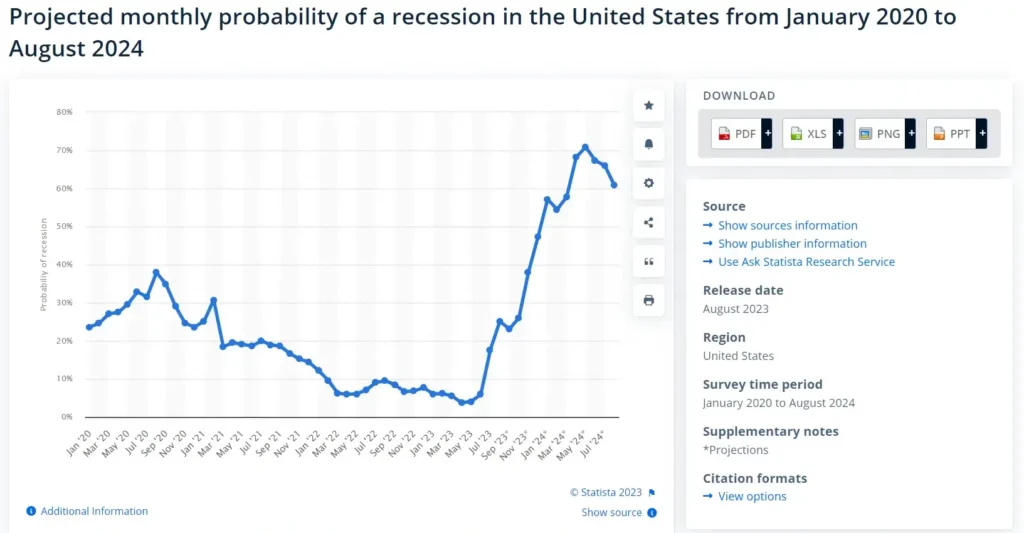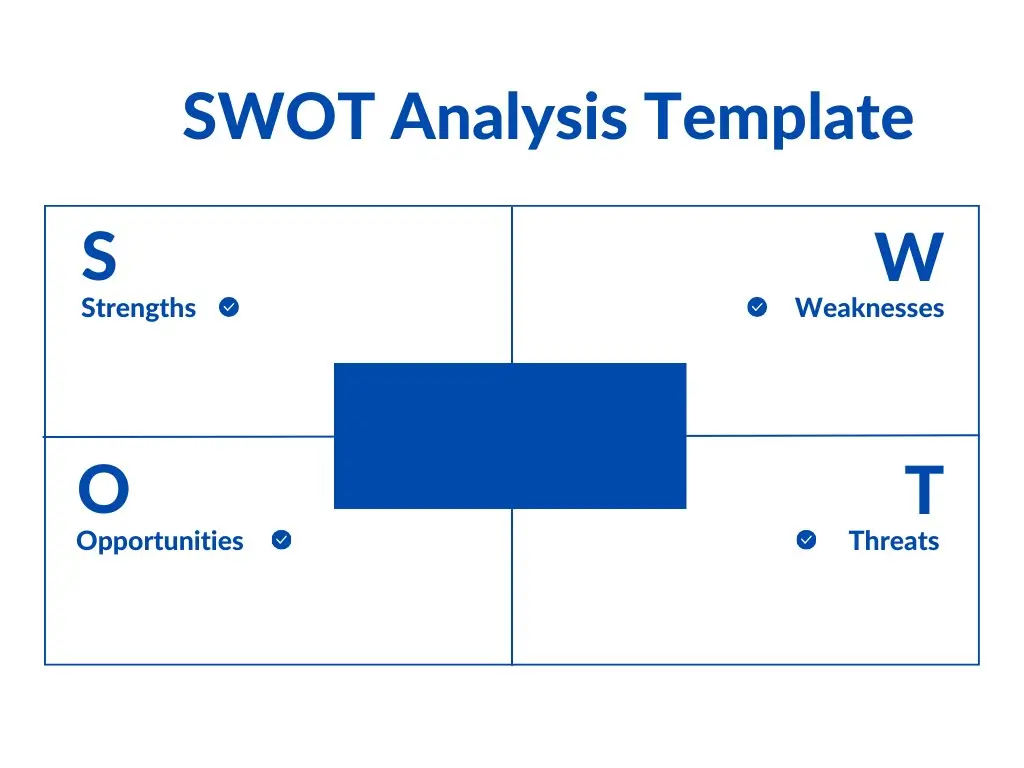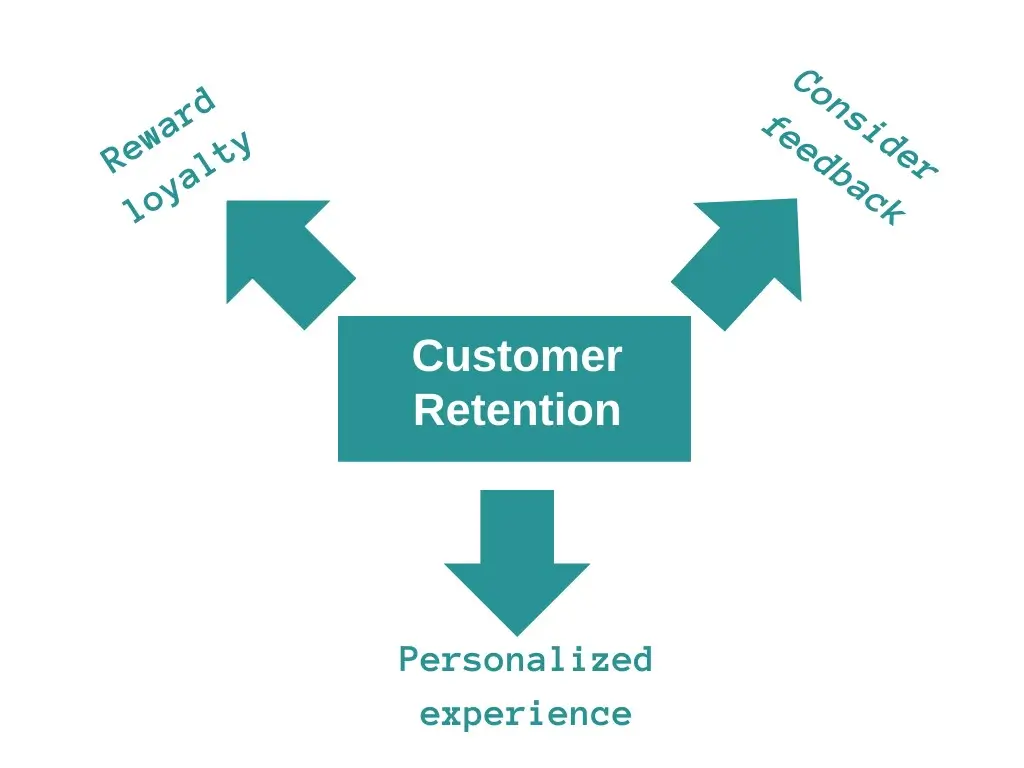How to recession-proof your business to survive an economic downturn

Words like recession and economic downturn can be scary for business owners. How will they survive when customers aren’t spending? How big of a safety net do they need to fall back on?
In this article, we’ll explore how to make your business recession-proof. We’ll walk you through the three areas that need close attention—planning, finances, and investments.
What happens in a recession?
According to Statista’s latest projections, the likelihood of the US falling into a recession is currently rising and is set to peak in May 2024. This can worry businesses, as recessions often mean non-essential spending decreases, as does access to credit.
Imagine you are a software company in the middle of a recession, and your service is a business VoIP app. Your main clients are other businesses with declining sales due to an economic downturn. They want to cut costs and consider whether they can still afford your service.
If your company is unprepared for difficult times, you may not survive the next economic downturn. Yes, some industries are recession-resistant because they provide essential products or services. However, it is still important to look into how to minimize losses during this time.

How can you recession proof your business?
There are many things to worry about when there is a threat of recession—rising costs, lower profit, and even decreased employee morale. It’s impossible to completely recession-proof your business. But there are some ways you can prepare for an economic downturn. This involves forward planning, organizing your finances, and making smart investments.
1. Forward planning
Reevaluate your business plan
Does your business plan cover how your company would stay afloat during a recession?
You should be identifying the risks for different scenarios so that you know how to mitigate them in advance. You are more likely to make bad business decisions if you don’t have the information you need when the problem has already presented itself.
Also, include any partners and investors in the conversation around recession-proofing. Not only will it look good that you are thinking long-term, but they may also be able to assist you.
Consider who else could be affected by a recession, as this could knock on your business. Look at your current agreements with suppliers and clients, and consider contract negotiation to make them work better for all parties involved. For example, a supplier may agree to a more flexible contract if you stay loyal to them.
Look at your core operations
Extending your services or branching out into new products at the threat of a recession can be tempting. More products and services mean more profit, right? Not exactly.
Recession could be the worst time to diversify your business, as it takes your eye off your core operations. A new business opportunity also brings new competition and investments you may be unable to afford. Is it worth the risk?
Instead, use this time to make your core operations as strong as possible. Look at sales projections and factor in a potential downturn. Research your customers’ needs, as they may have changed since you set your business up.
It is better to go into a recession knowing exactly what you have to work with rather than having scattered priorities.
Evaluate your competition
The hard truth is that weaker companies in your industries may not survive a recession. That is why being at the top of your industry is important.
Use SWOT analysis tools (strengths, weaknesses, opportunities, and threats) to evaluate yourself and the competition. Use the data collected and analyze the results to compare your business to theirs and determine how to improve. Make sure to play to your strengths, too.
A recession is a difficult time for all businesses. But if you enter as the market leader, you will be the company customers turn to when other companies fall.

Find out your workforce needs
To survive a recession, you need an agile workforce.
It’s always good practice to look at what skill sets need to be added within your employee base and if their needs are met, recession or not.
Many companies start laying off their staff at the first sign of financial difficulties. However, it is more cost-effective to create the ideal workforce in advance.
Companies with low staff retention rates tend to do poorly in recessions, as repeatedly hiring and training new staff can become costly.
For example, call center retention rates are low, as the work can be emotionally demanding. Call centers need to create a more rewarding workplace environment to counteract this. This could be giving employees extra training, reviewing bonuses, and ensuring they have the right tools.
If you want to take on new staff, do it as soon as you see the need, as it will take more work to take on new costs during a recession. Alternatively, consider upskilling the workforce, as multi-skilled employees are more valuable to a workplace.
2. Get your finances in order
Secure capital by creating a backup fund
Business owners must ask themselves if they have enough cash reserves to survive a recession. Sales and profits may be high at the moment, but a decline, even a temporary one, could strain a company’s finances.
The solution is a cash flow plan. Where is your cash flow coming from, and where is it going? Do you have a backup fund?
As mentioned, talk to investors and partners as you plan for a recession. You can offer investors a larger portion of your company in exchange for assistance if you face financial difficulty.
You could also look at other options, such as loans or selling company assets. Make an inventory of any assets that can be sold if needed. Also, talk to loan companies in advance. Find out if you can get pre-approved for a set amount so you have a cash reserve to fall back on.
Look at operating costs
It is easy to let budgets slide when your business is doing well. But good money management has to be at the top of your priorities when creating a recession-proof business.
The key thing is to reduce your overhead as much as possible. This will increase profits in the short term and give you more of a safety net in the long term.
There are a few ways you can cut operating costs:
- Go paperless: Not only does this cut down on printing and stationery costs, but it also creates a more sustainable business.
- Keep a tight inventory record: If you have an accurate record, you can downsize your inventory and only make purchases when needed.
- Pay-as-you-go: This encourages you to make purchases based on current funds and sales figures.
- Renegotiate contracts: You can get a better deal if you have worked with a supplier for a long time.
- Embrace automation: Automation can take over repetitive, menial tasks so that you can use staff hours for more productive work.
Pay off your debts
Most companies have some debt. It could be initial start-up costs or business loans for essential equipment. The problems come when you need more income to pay off those debts. If you are in a position to do so, pay off as much of your debt as possible.
Even a slight increase in debt repayments in a more profitable month could put you in a better position if you are in the middle of an economic downturn. Your accountant or bookkeeper is the best person to talk to for advice on your business finances.
3. Smart investments
Reconsider big investments
Recession may seem the perfect time to make a big investment. The business is doing well, profits have increased year by year, and an unmissable opportunity has arisen. But have you looked at the state of the economy? Before making any investments, ensure you have the cash reserves to survive if things slow down.
Don’t stop marketing
A recession is the time to reconsider investments, but don’t stop marketing.
When times are hard, and profits are declining, your customers need to know you are still here. If you have projected you’ll need more money for your usual marketing strategies, look at your current campaigns. Put your budget into the ones that have worked best in the past, and cut any that could be more cost-effective.
Then, it would help if you looked for alternative marketing opportunities that highlight your business’s strengths. Many companies are turning to social media and affiliate marketing for more cost-effective ways to advertise their brand.
Make customer retention a priority
According to Invesp, it costs five times as much to attract a new customer than it does to retain one. So, it would help if you worked on your client relationships before a recession hits. Return customers may be what saves your business. If you’re struggling with customer retention, look at your customer journey. Most consumers want the same thing:
- To be valued: Reward loyalty.
- To be heard: Take reviews and feedback into consideration.
- A personalized experience: Craft special offers, thank you emails, and personalized packaging.

You should invest in a sales engagement platform. This allows you to track all interactions with customers and, in this way, learn from past interactions and build personalized relationships with clients.
Keep your technology up to date
Keeping your workplace technology updated can be difficult when cutting operational costs. However, some investments in technology can be beneficial.
For example, invest in remote PC software to allow your employees to work remotely. With this, unplanned absences due to transport issues, lack of childcare, or illness can be reduced, making it more cost-effective for the company in the long run.
Conclusion
Recessions are an inevitable part of life that many companies dread. But with our recession-proof business guide, your business can find ways to make it through.
The key to surviving an economic downturn is to create a plan. Look at all possible scenarios and mitigate the risks. Remember the importance of having enough capital to keep the company afloat when sales are low. Finally, smart investments can also differentiate between a business that survives and one that doesn’t.

